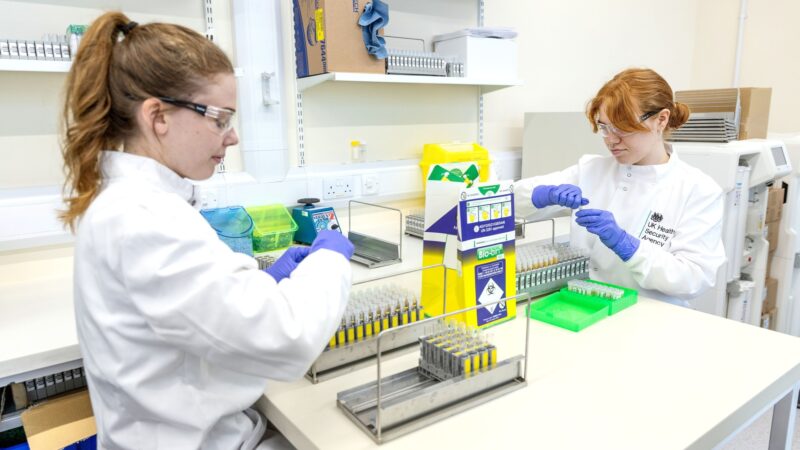Misbah Latif
Passing through stringent security measures at the remote facility, rare access has been granted to a group of scientists.
These experts are stationed within the newly established Vaccine Development and Evaluation Centre — a part of Porton Down — a response to the Covid crisis aimed at preserving lives and mitigating the need for future lockdowns in the face of emerging diseases.
According to Prof Dame Jenny Harries, CEO of the UK Health Security Agency (UKHSA), which oversees these laboratories, Covid is undoubtedly not an isolated incident.
“We describe it [Covid] as the most significant public health event in a century, yet none of us believes it will take another century before the next one comes along,” she elaborated.
She says the escalating risk due to the interplay of climate change, urbanisation, and the proximity of humans to animals is the origin of many emerging diseases that can transfer to humans.
Situated in the serene Wiltshire countryside near Salisbury, Porton Down stands as one of the few facilities globally equipped to study some of the most virulent viruses and bacteria.
The containment freezers hold pathogens like Ebola. Adjacent structures encompass the Defence Science and Technology Laboratory, part of the Ministry of Defence, where the use of the nerve agent Novichok in the Salisbury poisonings was confirmed.
Originally constructed as part of the emergency response to Covid, the vaccine laboratories, housed in dark green edifices inside Porton Down, have shifted their focus as the pandemic’s acute demands have eased.
The new vaccine research hub concentrates on three categories of threats:
1. Established infections that are growing more resistant, such as antibiotic-resistant superbugs.
2. Potential threats that could pose challenges, including avian flu and emerging Covid variants.
3. “Disease X,” an unforeseen pathogen akin to Covid that catches the world off guard.
The centre’s objective is to collaborate with the pharmaceutical industry, scientists, and medical professionals to support all stages of vaccine development.
Scientists at Porton Down are presently working on the initial vaccine for Crimean-Congo Hemorrhagic Fever, a tick-borne disease that claims approximately a third of its victims.
This malady is prevalent in Africa, the Balkans, the Middle East, and Asia, with the potential to spread further due to climate changes.
Simultaneously, the facility evaluates vaccine effectiveness. Notably, researchers at the centre detected that the Omicron variant could evade certain protections provided by existing Covid vaccines.
They continue to scrutinise new Covid variants by cultivating them in the lab, subjecting them to antibodies from blood samples, and assessing their capacity to infect.
Meanwhile, key machines—informally named “Qui-Gon,” “Obi-Wan,” “BB8,” and “Palpatine”—form part of the front-line defence against the world’s largest avian flu outbreak.
The H5N1 avian flu virus has wrought havoc on bird populations, and routine testing of farmworkers has identified asymptomatic cases in the UK.
Notably, the team’s capacity for testing has surged from a mere 100 samples weekly before the pandemic to over 3,000.
This work contributes to the “100 Days Mission,” an audacious endeavour to develop a vaccine against novel threats within a hundred days.
Traditionally, creating and testing vaccines has spanned a decade.
However, the exceptional circumstances of the pandemic resulted in the production of the first Covid vaccines within a year, with distribution commencing in December 2020.
It is estimated that Covid vaccines saved over 14 million lives within the first year of deployment.
Prof Isabel Oliver, UKHSA’s chief scientific officer, envisions the potential impact if these vaccines had been available even slightly earlier.
She posits, “While they were produced faster than ever before in history, we could have preserved more lives and hastened the return to normalcy.” The aspiration is that the lessons gleaned from the Covid crisis will bolster preparedness for future challenges.
Prof Harries emphasises the necessity of proactive measures to forestall pandemics, moving beyond reactive responses and striving to halt nascent outbreaks in their tracks








